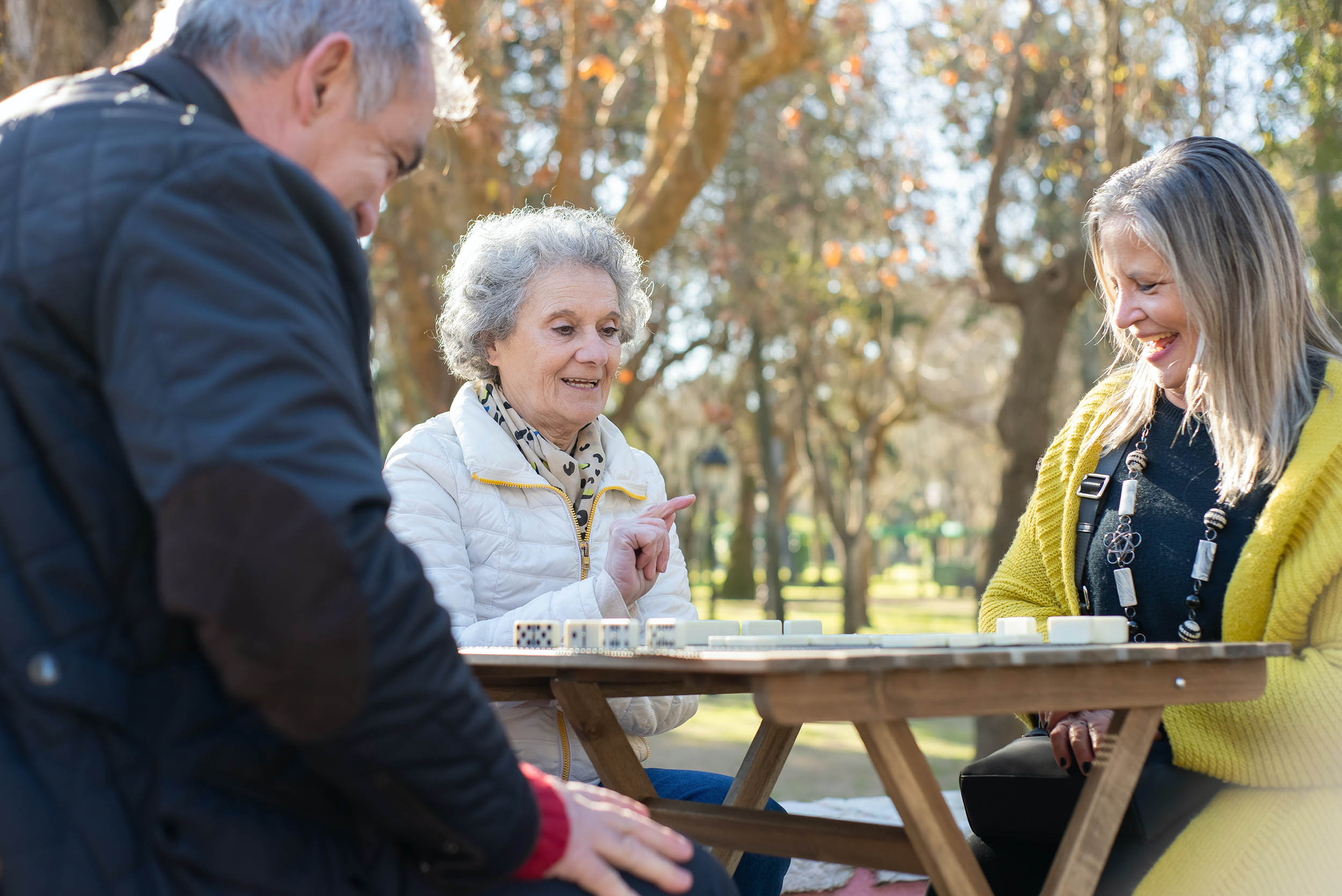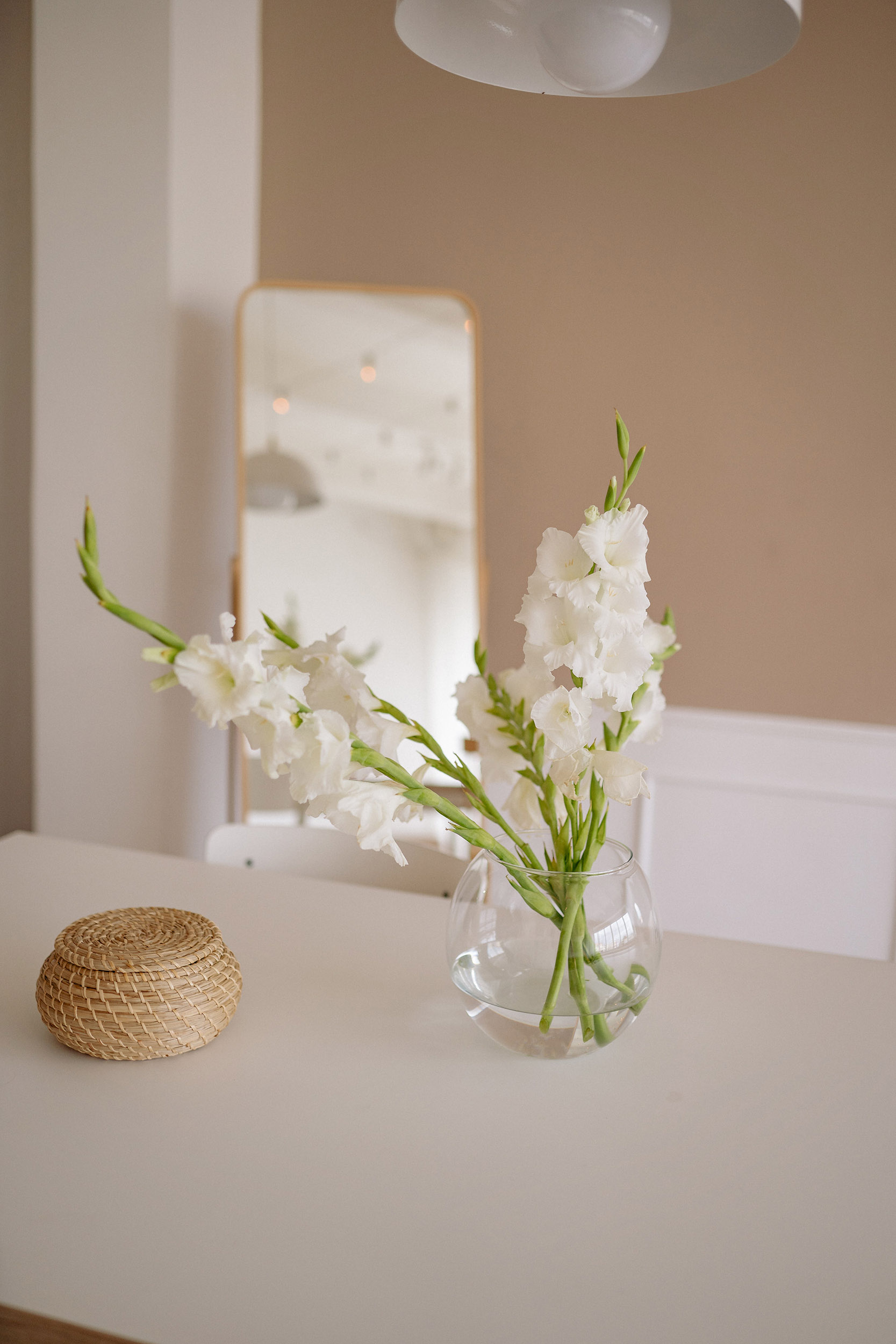Finding the Right Fit
a Senior Living Community
So, You’re Thinking About
Senior Living …
Big decisions start with important questions.

Do you remember when you purchased your first home? Can you imagine if you’d bought it sight unseen? You didn’t, of course. You worked with a
real estate agent who took you on a tour of it. You saw for yourself whether the kitchen was small or spacious. You opened closets and cabinets to see whether they would accommodate your things. You analyzed the floorplan to determine whether it would work for your family, looked at the yard to see if you could imagine your kids playing in it. You gazed out windows to check out the view, and drove around the neighborhood to see whether it felt welcoming, clean and safe. Like a new outfit before a special occasion, you tried it on to make sure it would fit.
But that’s not all you did. Because not everything is visible to the naked eye, you also asked questions. Lots and lots of questions. You might have asked when the home was built, for instance, or if it had ever flooded. You might have inquired about the condition of the roof and the age of the furnace. And you probably wanted to know about the quality of the local schools, and about the cost of property taxes. In short: You did your due diligence.
Shouldn’t you treat your future home
with the same scrutiny that you did
your first home?
Now, you’ve reached a stage in life where you’re ready for a new kind of home in which to live a new kind of life. The kind of home and life that only a senior living community can provide. But shouldn’t you treat your future home with the same scrutiny that you did your first home?
The answer is yes, of course. And yet, you might not know where to start. After all, a different kind of home demands a different set of questions. Don’t worry, we’ve got you covered. Whether you’re a senior who’s ready for a new chapter or a relative who’s helping a loved one turn the page, this guide should help you find the perfect match. Your tour guide will help you navigate the community; the following queries will help you navigate your decision.

You’ve reached a stage in life where you’re ready for a new kind of home in which to live a new kind of life.

Location, Location, Location
If your idea of senior living is a nursing home with cloistered residents who never go outside, then you need to rethink your notion of what senior living is, and what a senior living community can be. Modern senior housing isn’t institutional; it’s residential. In fact, senior living communities often look like college campuses, or suburban subdivisions. Sometimes, they even resemble small cities unto themselves.
Which is to say: When you reside in a modern-day retirement community, you don’t live away from the world; rather, you live in it. Before you can judge a community’s character, you should make sure it’s in an area that suits you, near the people, services and amenities that you want to be close to.
Consider the following questions to help size up the community’s location:
-
- Is the community located near family and friends whom I wish to visit, and/or whom I wish to visit me?
-
- Is the area in which the community is located safe and relatively crime-free?
-
- Is the community located near amenities I desire, such as shopping, parks, entertainment and dining?
-
- Are there medical facilities I need nearby, including a hospital and a primary care physician?
-
- If I need it, is there a reliable public transit system in the area?
-
- If traveling is important to me, how far away is the airport?
-
- Is the area in which the community is located clean and maintained?
-
- Who are the community’s neighbors? For example, are there undesirable businesses located next door or nearby that might produce undesirable noise, odors or traffic?
-
- What is the noise level like in the area surrounding the community? Is it too noisy? Or too quiet?
When you reside in a modern-day retirement community, you don’t
live away from the world;
rather, you live in it.

Grounds and Facilities
Remember: You’re not looking for a hotel where you’ll spend a few nights. You’re looking for a home where you’ll spend the rest of your life. It’s therefore important to look at senior living communities through the lens of everyday life. For example, you need to look at the grounds as if you were going to walk across them every morning, and the residences—which might include apartments, condominiums or even detached homes—as if you were going to lay your head in one of them every night. Because if the community is lucky enough to have you, you just might.
Be sure to keep your future self in mind when you’re looking at residences—your home should remain safe and comfortable as you age—and don’t forget to ask about policies and services that might make your home more or less livable.

Consider the following questions to help you evaluate the physical premises:
-
- What is your first impression of the community when you arrive?
-
- Are the community’s grounds and building(s) attractive and well maintained?
-
- Is there ample parking for residents and guests?
-
- Does the community provide exterior maintenance and landscaping services?
-
- Are there private residences available? If so, are they apartments, condos or houses?
-
- Are there different floor plans to choose from?
-
- Do residences come furnished or unfurnished?
-
- What items can residents bring with them when they move in? Are any items prohibited?
-
- May residents customize their residence with their own décor? What about new paint, flooring or other improvements?
-
- Are housekeeping and/or laundry services available? If so, how often, and can I request additional service as needed?
-
- Who is responsible for the maintenance of residences?
-
- Are pets allowed? What kinds? Any limitations?
-
- Can residents control the temperature in their homes?
-
- Is there extra storage available for residents who need it?
-
- What are the community’s move-in policies and procedures?
-
- What rules and/or covenants does the community have that I should be aware of?
-
- Under what circumstances are residents evicted?

Healthy Choices
For many older adults, aging is a razor-thin line between independence on one side and health and safety on the other. Although toeing that line can feel daunting, the right senior living community will make it easier by offering a level of living that is ideally suited to your needs—both now and in the future as your circumstances change.
Types of senior living communities include:
Independent living communities
Independent living communities are designed for self-sufficient seniors who crave community with their peers, but also want to maintain an independent and autonomous lifestyle.
Assisted living communities
Assisted living communities resemble independent living communities but offer on-site care for older adults who need help with daily activities like medication management, bathing, dressing and transportation.
Memory care communities
Memory care communities are assisted living communities designed to accommodate seniors with cognitive illnesses like Alzheimer’s disease and other forms of dementia.
Skilled nursing facilities
Skilled nursing facilities provide 24-hour supervised care for older adults who have severe physical or cognitive illnesses that make them dependent on others.
Life plan communities
Life plan communities—also known as continuing care retirement communities, or CCRCs offer independent living, assisted living, memory care and skilled nursing all within the same community in order to accommodate seniors as they age.
The right senior living community will make it easier by offering a level of living that is ideally suited to your needs.

To determine which level of care is best for you or your loved one, take stock of your goals with regard to independence and your needs with regard to medical care. Then, consider the following questions to get a feel for whether a community can satisfy your requirements:
-
- Does the community offer the level of living—e.g., independent living, assisted living, memory care, skilled nursing—that I need and desire right now?
-
- What about the future? Does the community offer different levels of living in case my needs change as I age?
-
- Are there on-site physical and/or occupational therapy services to help me develop and/or maintain the balance, strength and mobility I need in order to live independently?
-
- Are there doctors and/ or nurses who work on site, or who visit the community regularly? If so, what services do they provide, and are they available 24/7?
-
- What third-party, offsite medical providers does the community partner with?
-
- Do specialists—for example, podiatrists, audiologists and eye doctors—visit the community regularly?
-
- Does the community offer skilled nursing and/or memory care services, if I need them?
-
- Does the community provide transportation to off-site medical appointments and/or other needed services (e.g., shopping, beauty appointments, etc.)?
-
- Does the community assist residents with filling and refilling prescriptions, and with taking their medications?
-
- If I have a chronic condition, is the community equipped with the services and accommodations I need to manage my condition?
-
- What are the community’s policies and procedures for responding to medical events and emergencies?

Safety First
Doctors and nurses can keep you healthy and treat you when you’re ill, but they can’t prevent accidents or protect you from other risks, like crime and weather. It’s therefore important to inquire about safety features, protocols and procedures within any senior living communities that you’re touring.
Consider the following questions to determine whether you’ll feel safe and protected:
-
- Is the community—including both private residences and common areas—accessible for residents who use a walker, wheelchair or scooter?
-
- Are exits clearly marked in residences and common areas?
-
- Are the grounds, including parking areas, well lighted for safety?
-
- Do residences come with safety features I need now or might need in the future, such as handrails and grab bars?
-
- Are residences equipped with an emergency alert system and a sprinkler system for fires?
-
- How will the community respond and help me in the event of a natural disaster or other safety emergency, like a fire?
-
- Do staff check in on residents? If so, how often?
-
- Will staff have access to my residence? If so, when and under what circumstances may they enter?
It’s important to inquire about safety features, protocols and procedures within any senior living communities that you’re touring.

Live, Laugh, Love
Top of mind when you’re looking at a senior living community is where you’ll live. An equally essential question, however, is how you’ll live. With that in mind, it’s important to evaluate what a retirement community offers not just in the way of senior housing, but also in the way of activities, amenities and events. Most seniors want to be able to indulge interests and hobbies that they can do independently and alone while also engaging in social activities that they can do with others—including new friends, which can be hard to make as an older adult.
It’s not just about staying occupied. It’s also about staying well, as seniors who are active and social tend to have better physical, mental and emotional health.
Consider the following questions to get a sense for social prospects:
-
- What common areas and recreational facilities does the community offer?
-
- Do residents at the community seem happy, and do you see them socializing with each other?
-
- Does the community offer a fitness center or gym where I can exercise?
-
- Are there group fitness classes, like yoga and tai chi?
-
- Does the community offer opportunities to engage in hobbies I love, such as gardening, singing, swimming or tennis?
-
- Does the community offer outlets for creative expression, like painting classes or crafting workshops?
-
- Does the community offer opportunities for me to try new activities that I’ve never tried before?
-
- Will I find outlets for intellectual stimulation within the community, like book clubs or study groups?
-
- Are there outdoor spaces where I can walk, bike or participate in activities beyond the walls of the community?
-
- Does the community offer organized field trips and excursions that will allow me to experience cultural attractions and/ or events, such as movies, museums, theater and concerts?
-
- Is the community set
up in a way that will
facilitate informal and
spontaneous social
interactions with friends
and neighbors?
- Is the community set
It’s not just about staying occupied. It’s also about staying well, as seniors who are active and social tend to have better physical, mental and emotional health.
-
- Does the community organize or facilitate volunteer opportunities for residents who want to do volunteer work?
-
- If I want to travel, will the community afford me the opportunity to do so?
-
- If spirituality is important to me, does the community offer a place of worship and/ or religious services?
-
- How often does the community offer activities? Daily? Weekly? Monthly?
-
- Does the community offer activities at all times of day—morning through evening?
-
- Are my children and grandchildren welcome to visit? Are there visiting hours or other restrictions I should be aware of?
-
- May family participate in activities with me?
-
- Does the community host regularly scheduled family days or other family-inclusive events?
-
- Do outside entertainers visit the community? If so, what types and how often?
-
- Does the community have social media pages for residents where they can socialize and interact with each other online?
-
- If I require a higher level of care, does the community offer individual and/or group activities that cater to my needs and are tailored to my physical and/or cognitive abilities?
-
- Do residents have input in what activities and events are offered at the community?

Food for Thought
The average person spends 1.18 hours every day eating and drinking. Although that might not sound like much, it adds up—to more than eight hours per week, 35 hours per month and more than 430 hours per year. When it comes to choosing a senior living community, food should therefore be top of mind. Or rather, top of mouth. Not just because you spend so much time eating, or even because you enjoy eating delicious food. But also because good nutrition is paramount to seniors’ health and wellbeing.
Consider the following questions to get a flavor for the food and dining situation:
-
- Does the community offer dining services If so, what are the different dining plans available?
-
- Is food prepared on site or off site? In either case, who prepares it?
-
- Are dining and kitchen facilities clean and inviting?
-
- Do residences have kitchens or kitchenettes where I may prepare my own meals?
-
- Where do residents eat? Is there a dining hall? Or perhaps multiple restaurant-style venues?
-
- If residences lack kitchens, are there prohibitions on appliances like microwaves, refrigerators and hot plates?
-
- Can the community accommodate any dietary restrictions I might have? For example, if I have diabetes, if I’m a vegetarian or if I require low-sodium options?
-
- Is there a private dining room available for reservation?
-
- Do residents have input in meal planning?
-
- When is food served? Are there strict dining hours or flexible mealtimes?
-
- Are meals made to order, and can they be customized to my tastes?
-
- Are there snacks and beverages available in between meals and on demand? Even in the middle of the night?
-
- Can meals be delivered, or picked up for take-away?
-
- How do residents dine when they’re sick or immobile?
-
- Are there dietitians on staff who can help me assess my nutrition and maintain a healthy diet?
-
- Can family and friends dine with me when they visit?
-
- Are catering services available for group events?
-
- Are there accommodations for residents with impairments that make it difficult for them to eat or use utensils?
-
- Does the community offer dining assistance if I need it?

Friendly Faces
A major selling point for retirement communities are the friends you’ll make there. But they aren’t the only folks who can shape your life at a senior living community. Just as consequential are the people who work there. The size and makeup of the staff, for example, can affect the level of service you receive while employees’ experience level and personality can have a major bearing on your daily experience.
Consider the following questions to help you assess the staff:
-
- Do staff seem warm, welcoming and friendly?
-
- What is the overall staff-to-resident ratio at the community?
-
- In assisted living, memory care and skilled nursing communities, what’s the staff-to resident ratio with respect to nurses, certified nursing assistants and other caregiving professionals?
-
- What are the various staffed positions that exist in the community, and what are the specific duties of people in each position?
-
- How do staff and residents communicate?
-
- What level of familiarity exists between staff and residents? Do staff know residents by name?
-
- How are staff hired and vetted, and how are they evaluated and assessed thereafter?
-
- Do staff receive regular training, education and development? If so, what types of training, and how often?
-
- What is the community’s track record with regard to employee retention? Do staff have a history of staying in their jobs, or do they tend to be more transient?
-
- Do residents have the opportunity to assess staff and the quality of service they receive from them? If so, how is feedback collected, and how often? What does recent feedback reveal?
-
- If you require nursing or other assistance, can you request a certain caregiver—for example, a caregiver of your same gender?
-
- Do volunteers come to the community to do volunteer work with residents? If so, what kind of groups come into the community, and what kind of volunteer work do they do?
-
- Is there staff on site 24/7? What type of staff—and how many—are on site during overnight hours?

A Penny for Your Thoughts
but it can also save you money.
Real estate decisions are among the biggest decisions most people make. Not only because of their impact on one’s life, but also because of their impact on one’s bank account. Before you move into a senior living community, it’s important to understand what resources it will require, and how it will affect your overall financial goals—including everything from saving to estate planning.
While you need to be mindful of your current as well as future financial situation, also keep in mind that a senior living community isn’t just an expense; with appropriate planning and by choosing the right level of living to meet your needs, a community can be an asset that helps to conserve precious resources and extend your life.
Consider the following questions to determine whether living in a community is fiscally feasible:
-
- What do different levels of living cost per month?
-
- How is the cost structured? Is the community all-inclusive, for example, or fee-for-service?
-
- What services are included in my monthly rent?
-
- What is not included in my monthly rent— particularly in the case of “all-inclusive” communities?
-
- If there are à-la-carte services that are offered which are not included in my monthly rent, what will those services cost?
-
- How do the costs of living in the community compare to the true costs of aging in place at home?
-
- As my needs change, how might my costs change?
-
- Are you offering any move-in specials that I should be aware of?
-
- Is renter’s insurance required?
-
- What financial qualifications does the community require for admission?
-
- What sort of payment plans are available to residents?
A community can be an asset that helps to conserve precious resources and extend your life.
-
- What types of contracts and billing arrangements are available?
-
- Are contracts all or partially refundable? If so, do refunds come with fees?
-
- Will the community be able to accommodate me if my financial situation changes, or if I need to downsize in the future? If not, will I be charged fees to cancel my contract and move?
-
- Does the community have a benevolence program to help me stay in the community if I outlive my assets?
-
- Do you have a history of raising your prices? If so, how often do you change your prices, and do you notify residents when their costs are going to change?
-
- Does the community accept my insurance— e.g., Medicare, Medicaid, long-term care insurance, private insurance—for the level of care I require?
-
- Is the community’s ownership organization financially stable?
-
- Do you offer financial assistance, or can you point me to organizations you work with that do?

The Choice is Yours
right community for you?
You’ve asked the questions. You’ve gotten the answers. Now, all that’s left is the hardest part: making a decision.
Whether to sign a contract with a given senior living community is as difficult a choice as it is big. If you’ve asked the questions in this guide, however, you can breathe easy knowing you’ve done your due diligence. Don’t rush yourself. Sit with the information you’ve gathered, discuss it with loved ones you trust, and listen to your gut. When you know, you’ll know.
In that way, choosing a new home today is a lot like buying your first home was all those years ago—when it is right, it will feel right.
You’re not just spending money. You’re getting something in return.




